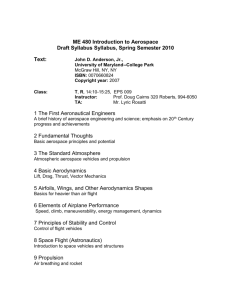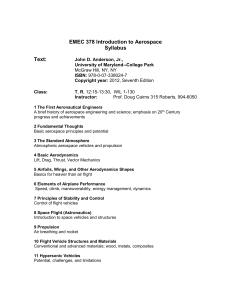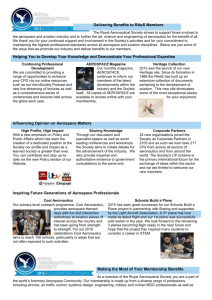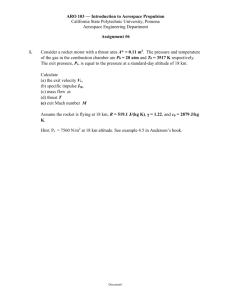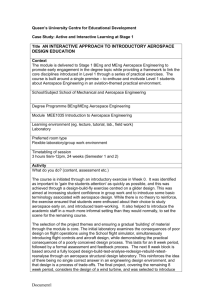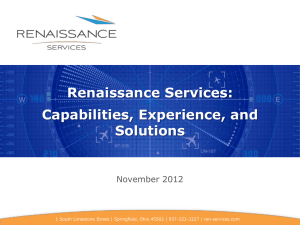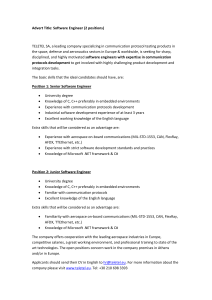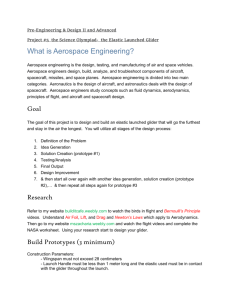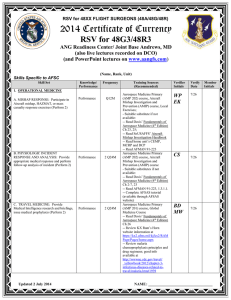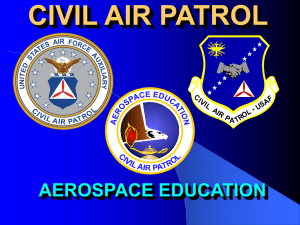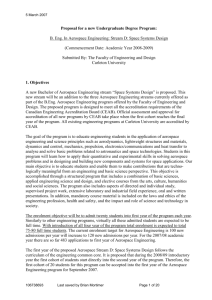Aerospace Engineering - Davis School District
advertisement
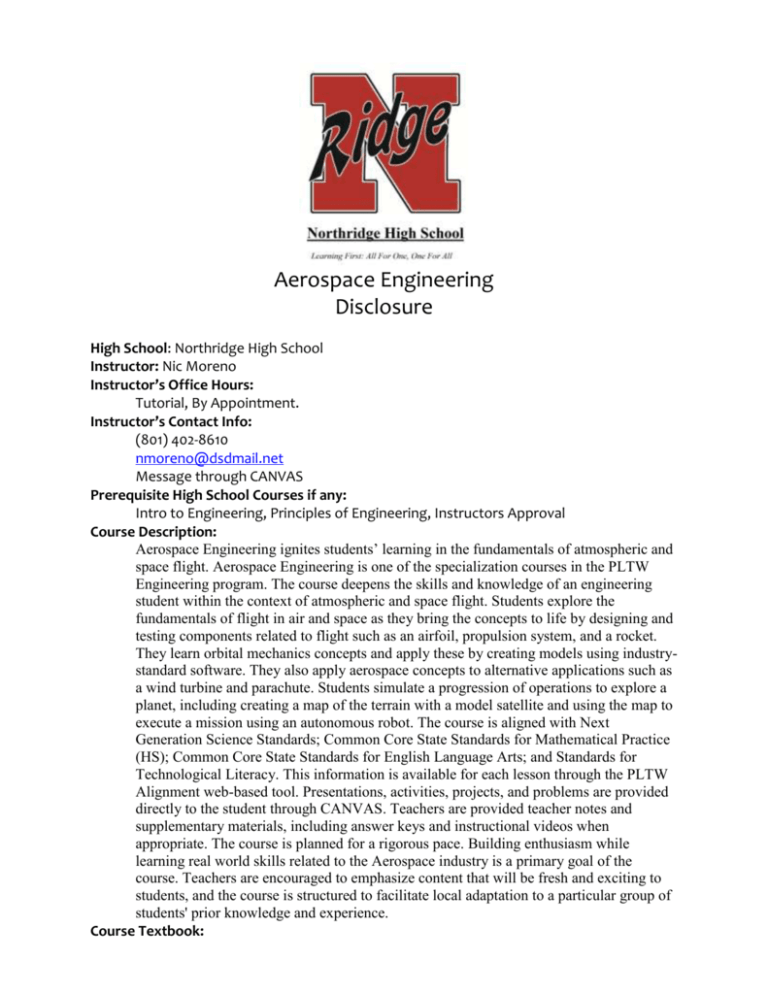
Aerospace Engineering Disclosure High School: Northridge High School Instructor: Nic Moreno Instructor’s Office Hours: Tutorial, By Appointment. Instructor’s Contact Info: (801) 402-8610 nmoreno@dsdmail.net Message through CANVAS Prerequisite High School Courses if any: Intro to Engineering, Principles of Engineering, Instructors Approval Course Description: Aerospace Engineering ignites students’ learning in the fundamentals of atmospheric and space flight. Aerospace Engineering is one of the specialization courses in the PLTW Engineering program. The course deepens the skills and knowledge of an engineering student within the context of atmospheric and space flight. Students explore the fundamentals of flight in air and space as they bring the concepts to life by designing and testing components related to flight such as an airfoil, propulsion system, and a rocket. They learn orbital mechanics concepts and apply these by creating models using industrystandard software. They also apply aerospace concepts to alternative applications such as a wind turbine and parachute. Students simulate a progression of operations to explore a planet, including creating a map of the terrain with a model satellite and using the map to execute a mission using an autonomous robot. The course is aligned with Next Generation Science Standards; Common Core State Standards for Mathematical Practice (HS); Common Core State Standards for English Language Arts; and Standards for Technological Literacy. This information is available for each lesson through the PLTW Alignment web-based tool. Presentations, activities, projects, and problems are provided directly to the student through CANVAS. Teachers are provided teacher notes and supplementary materials, including answer keys and instructional videos when appropriate. The course is planned for a rigorous pace. Building enthusiasm while learning real world skills related to the Aerospace industry is a primary goal of the course. Teachers are encouraged to emphasize content that will be fresh and exciting to students, and the course is structured to facilitate local adaptation to a particular group of students' prior knowledge and experience. Course Textbook: Curriculum is found within each module in the online CANVAS Learning Management Software in PDF/Word/PPT format. Course Equipment: UEN Canvas Login Firefox or Google Chrome Internet Browser Adobe PDF Reader Print to PDF capability Something Capable of digitizing Letter & Ledger size paper or Digital Camera or Camera Phone Course Administration: Lectures will concern the body of knowledge surrounding Aerospace Engineering. Demonstrations will cover specific operations and techniques. Students are expected to be at all class sessions (see Excused Absences policy below). If a student has to miss a lecture or a demonstration, permission for an excused absence must be granted by the instructor before class. It is the responsibility of the students to secure all materials and information presented in class, even with an excused absence. Lectures will not be repeated. Lectures may be taped recorded with the instructor's permission. Attendance Policy: Students are considered Design Engineering Technology professionals and are responsible for directing their own education. Absences CAN effect student grades if they do not understand the material or are not aware of changes to the class that can include (but are not limited to) the scheduling of quizzes, exams, assignments, and projects. The instructor has the right to alter the course at his own discretion, so students missing class may not be aware of important information. Students are responsible for the body of information in the lectures, labs, and assigned reading materials. Students who do not attend class will not be given makeup lecture sessions or notes by the instructor. Similarly, makeup tests and quizzes will also not be given. If a student misses a class, it is up to them to make sure they acquire the relevant material from another source. Do NOT send the instructor an e-mail asking to explain the contents of a missed lecture or lab. Outside Work: Outside work will be absolutely necessary. Students will NOT be able to do well in this course if they work only in regularly scheduled class sessions. Course Projects: Students will be expected to successfully complete multiple projects throughout the course of the semester. Projects will be graded on professionalism, execution, creativity, technical merit, and communicative value. Exams: Exams will cover material from the lecture, demonstrations, and laboratory portions of the course and be administered during the regularly scheduled lecture period. The module assessments will be a comprehensive assessment of both theoretical and application at the end of each module. The final comprehensive assessment will be a collection of questions taken from each of the module assessments and be given at the appropriately scheduled time. Grading Policy: Grades will be given using the following total earned scores. 94-100% = A 74-76% = C 90-93% = 87-89% = AB+ 70-73% = 67-69% = CD+ 84-86% = B 64-66% = D 80-83% = B- 60-63% = D- 77-79% = C+ 59-0% = F Course Content: Unit 1……………………………………….……………Introduction to Aerospace (28%) Introduction to Aerospace Lesson Summary Lesson 1.1………………Evolution of Flight Lesson 1.2………………Physics of Flight Lesson 1.3………………Flight Planning and Navigation Unit 2……………………………………………….……………Aerospace Design (29%) Aerospace Design Lesson Summary Lesson 2.1………………Materials and Structures Lesson 2.2………………Propulsion Lesson 2.3………………Flight Physiology Unit 3……………………………………………………………………….…Space (18%) Space Lesson Summary Lesson 3.1………………Space Travel Lesson 3.2………………Orbital Mechanics Unit 4……………………………………………………...Alternative Applications (25%) Alternative Applications Lesson Summary Lesson 4.1………………Alternative Applications Lesson 4.2………………Remote Systems Lesson 4.3………………Aerospace Careers Computer Privileges: Students are expected to use the computers in the lab for educational purposes only. The computers are not to be used to play games, stream music or videos, access social media, or browse the web for anything other than class activities. Any student who abuses this privilege will be given a verbal warning. If the student persists, their computer privileges will be revoked in class. Students will need to make other arrangements to complete the assigned work if the above expectations are violated. Parents/Guardians: Because your student is most likely a minor, NHS requires documentation showing that you have read this syllabus. To sign this syllabus digitally, please copy and paste the following into an Email to Mr. Moreno nmoreno@dsdmail.net with your student’s full name and class period in the subject line: I have read and agree to the conditions of this syllabus for Aerospace Engineering Student Name:_______________________________________________________ Parent/Guardian Name:_________________________________________________
